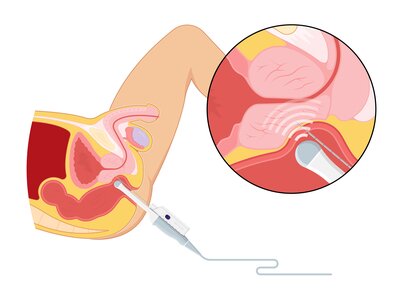Prostate Biopsy
Prostate Biopsy
What is a Prostate Biopsy?
The prostate is a gland in the male reproductive system located just below the bladder. It plays an important role in producing seminal fluid.
A prostate biopsy is a procedure in which small samples of prostate tissue are taken, usually under the guidance of transrectal ultrasound (TRUS), to check for the presence of prostate cancer. The collected tissue samples are then sent to a pathology laboratory for evaluation.
This is typically an outpatient procedure and can often be performed in urologist’s office.
Why a Prostate Biopsy is Performed?
A prostate biopsy may be recommended in the following cases:
- Elevated Prostate-Specific Antigen (PSA) levels: PSA is a protein produced by the prostate. Higher-than-normal levels may indicate prostate cancer.
- Abnormal digital rectal exam (DRE): During a rectal exam, the doctor manually checks the prostate. If any lumps or irregularities are detected, a biopsy may be necessary.
- Abnormal imaging results: Imaging tests such as ultrasound or MRI may reveal suspicious changes in the prostate that warrant further evaluation with a biopsy.
How the Procedure is Performed?
- The patient lies on their left side with knees drawn up.
- Local anesthesia is injected into the rectal area to minimize discomfort.
- An ultrasound probe is inserted through the rectum to visualize the prostate.
- A thin biopsy needle, guided by the probe, is inserted into the prostate to collect several tissue samples.
- To reduce the risk of infection, an oral antibiotic is prescribed before the procedure and continued for up to two days afterward.
- The procedure usually takes about 20 minutes.
- Afterward, the patient rests for about 30 minutes, drinks fluids, and is monitored before being discharged.
- Biopsy results are typically available within 1–2 weeks.
Possible Side Effects
A prostate biopsy is generally safe and well-tolerated. Side effects are usually mild and may include:
- Minor rectal bleeding
- Discomfort in the rectal area
- Low risk of infection
Pre-Procedure Instructions
- Shower and shave the genital and abdominal area.
- Stop taking blood-thinning medications such as Aspirin, Warfarin, or Heparin (if applicable).
- Fast for at least 8 hours before the procedure.
- Remove watches, rings, and jewelry before entering the procedure room.
- Do not wear glasses, dentures, hearing aids, contact lenses, or prosthetics during the procedure.
- Empty your bladder immediately before the biopsy.
- Inform your doctor and nurse if you smoke or use other substances, and avoid smoking for at least 24 hours before the procedure.
Warning Signs
Patients should contact their doctor immediately if they experience:
- High fever
- Difficulty urinating
- Frequent urination
- Passing a large amount of blood in urine or stool
- Chills

